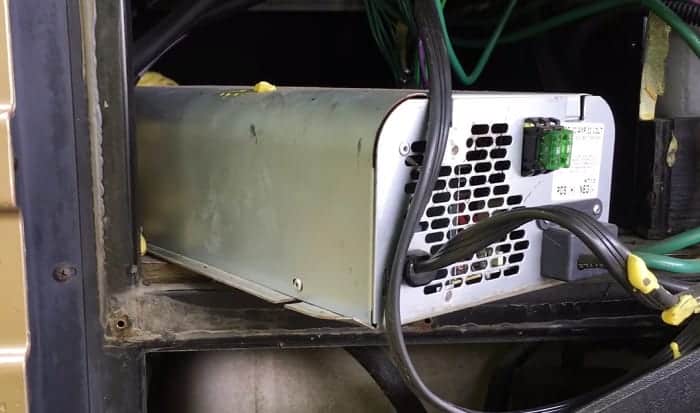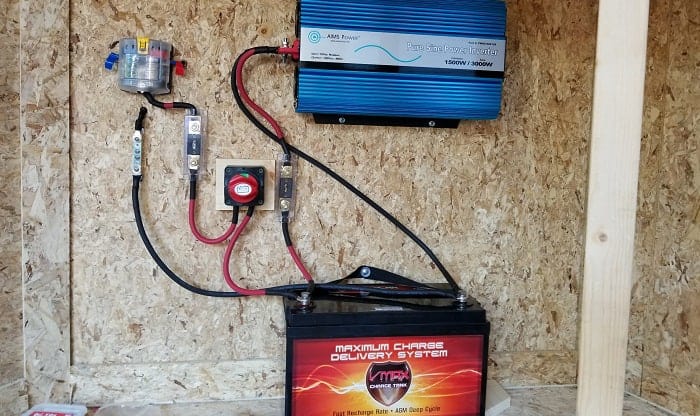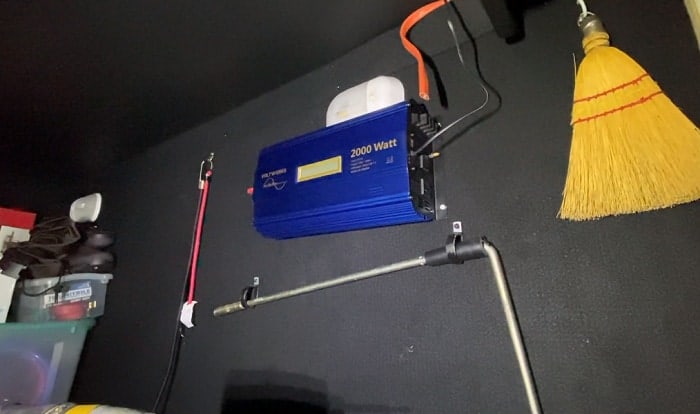Have you recently been interested in trying a camper’s life by investing in an RV? If yes, have you figured out the electrical system you are going to power it with? Several well-intentioned YouTubers have released videos to help you start your RV journey. However, they use the terms inverter and converter interchangeably, which is not the case. So, we have created this RV inverter vs. converter guide to help you make the right decision.
Table of Contents
Alternating Current Vs Direct Current
Before you start learning the difference between an inverter and converter, you should know how Direct Current (DC) and Alternating Current (AC) differ.
AC power is often used in your households to run the appliances and electronics. Everything you can plug into the wall socket is using AC power. It comes from the electrical grids and power lines, ranging from 120V to 240V.
On the other hand, DC Power is the power that is pre-stored in batteries to power other appliances and electronics. Even a cigarette lighter that uses batteries is using DC power. Apart from this, the vehicles with batteries, things plugged into USB outlets, and children’s battery-run toys use DC power.
You will be surprised to discover that you can also have customized vent fans, water pumps, lights, and more for your RV that runs on DC power. Often, it is available in 12V form.
So, your RV uses the AC power when you park your vehicle at a campsite to plug into the city power. Here, the electricity comes from electrical grids. However, when you are traveling off-grid, you have to use batteries. And batteries use DC power.
This is where the inverter and converter’s roles come in as they facilitate the switch between AC Power and DC Power. Essentially,
- Inverters and converters mirror each-others’ actions.
- You can convert AC power into DC power with a converter.
- The Inverter will convert DC power into AC power for you.
- The converter will allow you to charge your battery bank with city power.
- The inverter will facilitate the use of power stored in batteries to run appliances in the van.
Converting Power
Since the city power is available at over 120V AC, you cannot charge your batteries directly. You need a converter to convert the 120V AC into 12V DC to store power in your battery.
You can also refer to converters as chargers because they are primarily charging the batteries of your RV.
Most RVs are equipped with an AC converter. They can not only charge your batteries but also allow you to run the appliances simultaneously. They work incredibly well if you plan to spend most of your time on the road in RV parks or hooked up to a socket in the nearby gas station.
For those who want to travel and explore in their RVs, we have the smarter and more efficient, multi-stage converters.
Smart Converters
Smart converters run on the same principle as regular converters, but they charge your batteries faster and more completely. They have sensors to figure out if the RV batteries are full so that they can adjust the amperage and voltage to charge them more efficiently.
There are four stages of a charge assumed by smart converters: Bulk, Absorption, Float, and Equalize.
The bulk mode gets activated when the battery is almost depleted so that higher amperage can bring the battery to a near full capacity sooner. Now, for topping off the batteries, the convertor balances the amperage with higher voltage. In this way, no extra power reaches the battery, which can also be damaging. This is how multi-stage charging works.
Advantages of Smart Converters
- They allow faster charge as compared to regular chargers/converters.
- They ensure enhanced battery health in the longer run.
- If you have lithium-ion batteries, you cannot use standard converters because they are incompatible.
- Flooded batteries work well with standard converters, but if you upgrade to AGM or Gel batteries, your standard converter might not be charging them properly. This can ruin your expensive batteries if the converter is not replaced.
The PD9260CV Inteli-Power 9200 Series Converter Charger by Progressive Dynamics is one of the leading smart chargers for RVs. You can check this out if you are planning to upgrade your converter.
Inverting Power
Since you are planning to hit the road, it would be a safe-hazard to assume that you wish to be off-grid for most of your journey. Therefore, you will need DC power to run your laptops, hairdryer, coffee machine, vent fans, water pumps, and many more appliances. This DC power will be made available to you by inverters.
As opposed to converters, inverters turn 12V battery power and convert it into 120v AC power for the appliances to use.
Since inverters use batteries to draw power, they are only as good as your battery banks. As much as an inverter is necessary for your RV, you also need a converter to facilitate working. The power your converter can convert is not limited to city power as you can also install solar panels on your RV to make use of the renewable source of energy.
For increasing the efficiency of your RV’s electrical system, you can also upgrade to an inverter charger. An inverter charger is the combination of a smart converter and an inverter.
Inverter Chargers
Inverter chargers give you the best of both worlds by charging your battery banks and providing your power to run the electronics from the batteries.
Benefits of upgrading to an Inverter Charger
- They charge your battery bank faster.
- They offer all the advantages of a smart converter.
- They allow you to use all electronics off-grid.
- You can gain the functionality of a converter as well as an inverter from one device.
- There is an in-built automatic transfer switch, which will turn the charging on and off when required.
- They offer unmatched compatibility as you can use them with any battery type.
- Inverter chargers such as Victron MultiPlus 24/3000/70-50 have generators activated automatically when batteries are about to die down. They send signals to the generators to turn on and run till the batteries are topped off again. As a result, the battery banks in your RV will remain full without requiring you to intervene.
Can Your RV Do Without an Inverter?
Yes, most travelers do make do with charged batteries and 12V electronics on the road. This is a simple solution and can very well power the vent fans, portable refrigerators, lights, and a couple of more DC appliances. However, this will not allow you to have powered wall sockets at all.
If you wish to have wall sockets and some more appliances, an inverter would be helpful. Inverter chargers can be expensive to install, require regular maintenance, and comprehensive knowledge to deal with disruptions if they occur. Instead, you can opt for smart converters with standard inverters. They are less expensive, allow movement for miles without having to stop for topping off batteries, and are equally efficient.
Final Word
Finally, deciding upon whether you need an inverter or converter entirely depends upon how many amenities you want in your RV.
- If you plan to live a simple campers’ life with basic appliances like a portable refrigerator, vent fans, lights, and a couple of more devices, you can power your van with batteries and a small inverter. In this way, you will be using DC power to run your electronics.
- Converters and inverters are important for those planning on more advanced camping with several appliances that require wall sockets to run.
They can plug into the RV parks to allow converters to charge the batteries and inverter to convert the battery power into AC power for the appliances.
- While smart converters will help you charge your batteries better, inverter chargers will serve the purpose of both a convertor and charger. If you wish to keep the power-up in your RV without having to deal with it often, they are expensive but efficient options.

Hi, I am Tom Hank, an RV-er since 2014. Back then, I started without much help. As you can imagine, the struggles are endless. But now, you do not have to begin your adventures knowing next to nothing about RV lives.




